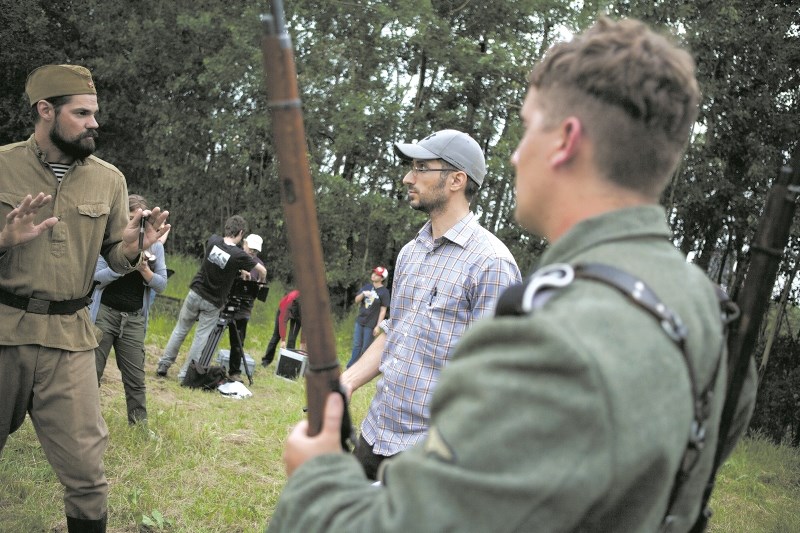St. Paul filmmaker Eric Spoeth is bringing his latest effort to the big screen this April, a docu-drama that weaves strands of his family’s story from the World War II to the present day.
Much of the story comes from interviews with his mother, Erika Spoeth, and her brother, and its premiere screening at St. Paul’s Elite Theatre on April 15 will also be the first time his mother will see the film.
“That’s what makes me the most nervous,” Spoeth admitted, adding he’s done his best to be historically accurate and true to the past. “You want to honour the legacy of the people they loved – you’re recreating memories that are sacred to them . . . I’ve done my best to ask for forgiveness.”
Waiting for Waldemar is a docu-drama, shot in and around the Ukrainian Cultural Heritage Village, the Village of Andrew, and rural areas of the Lakeland. The drama unfolds in Europe in September of 1943, around the time of Spoeth’s mother’s birth, but is mostly enacted in English.
Spoeth’s maternal grandparents were ethnic Germans, who had roots going back 200 years as settlers in Ukraine. However, when Hitler invaded the Soviet Union, ethnic Germans were no longer trusted in their adopted country, and their loyalty was questioned. Russian dictator Joseph Stalin began to collect Germans to send to labour camps in Siberia.
Among those captured was Spoeth’s grandfather, the eponymous Waldemar, who was taken along with a friend.
“They were on a truck, and believed they were going to be taken to a field and shot,” Spoeth said, adding his grandfather escaped and went into hiding. He managed to reconnect with his wife and four children, who all attempted to escape Ukraine for Germany.
“My family was among those who left by foot, by wagon, by train,” he said, adding his mother was the youngest of the children at six-months-old. During the trek, the family was separated from Waldemar, with the movie chronicling the search for the father who was never to be found, and whose end was unknown.
While part of the movie is set in an era of war, Spoeth is emphatic this is not the focus of the film.
“I wasn’t interested in making a war movie; nor was I interested in making something that was political,” he said. “In my mind, the more important theme there was we have the reality of these children of war, who, for years and decades after the war have suffered the after-effects of this displacement, this loss of homeland, this separation of family that never really goes away,” he said, noting his mother was displaced from Ukraine, and then from Germany as well, when she came to Canada at the age of 17.
“That was what I was trying to capture – anybody, no matter what side of the war they were on – anybody that has lost a father at a young age can identify that longing that never really goes away.”
The docu-drama features moments of poignancy that can resonate with everyone, for instance, of Spoeth’s grandmother waking up on a train and not seeing her infant daughter, panicking and looking everywhere.
“An old couple was lying there on the ground of course , and they had died overnight, and I was lying there between two dead people, with rosy cheeks,” Spoeth’s mother narrates. The film jumps between the past to the present, with interviews with Spoeth’s uncle and mother set amidst the drama of the past.
Spoeth said at first, his mother and uncle tried to dissuade him from shooting this movie, questioning who would be interested in it.
But Spoeth said he felt like he needed to learn more, to know more about his family’s history as a way of knowing himself. By using mainly volunteer actors, and doing much of the work himself, he was able to keep the budget to about $50,000, with the hopes of finding a distributor following the screenings.
He hopes the end product is one that reflects universal ideas, that everyone can relate to and identify with.
“People can take away from it the central theme, that love endures all, love bears all, love believes all, the idea that love has unreasonable faith,” he said, noting that for years, his mother and her siblings clung to the belief their father was alive, despite all reason to do so.
Another part of him saw the story through the lens of “history kind of repeating itself,” with the current Syrian refugee crisis and politics in America.
“I can’t help but realize we were refugees at one point. Many people might have refugee roots – they just may not realize it,” he said. “When we apply the lessons of past to present day, we might look at it a different way.”
Following the screening, there will be a Q & A session with Spoeth, while in other screenings taking place across Canada, Spoeth is aiming to bring together refugees and immigrants of all backgrounds to share their own stories, “as a means of bridging cultural divides and reconciliation.”
The 45-minute docu-drama will have its premiere screening in St. Paul’s Elite Theatre on April 15, from 4:30 p.m. to 5:45 p.m. and is open to the public.



